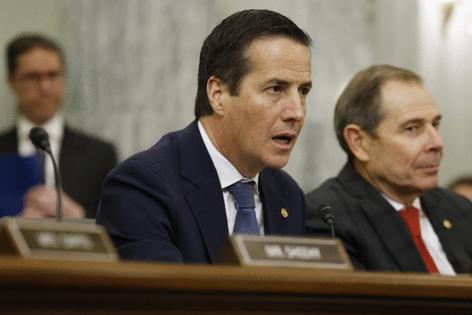Trump close to deal that would spare U.S.-assembled vehicles from tariff costs
Published in Business News
WASHINGTON — President Donald Trump is considering a modification to expensive automotive tariffs that would provide relief to manufacturers that complete final assembly in the United States, Reuters reported Friday.
Republican U.S. Sen. Bernie Moreno of Ohio told the outlet that the deal, which Trump would make a decision on soon, would incentivize automakers that keep or bring more assembly to the United States.
"The signal to the car companies around the world is look, you have final assembly in the U.S.: we're going to reward you," Moreno told Reuters. "For Ford, for Toyota, for Honda, for Tesla, for GM, those are the almost in order the top five domestic content vehicle producers — they'll be immune to tariffs."
Moreno and auto officials said that under the proposal, Trump would keep tax rebates for U.S.-assembled vehicles at 3.75%, extend the rebates to five years and offer rebates to U.S. engine production. Moreno’s comments represent a change in tune from earlier in the year.
He previously dismissed the notion of providing tariff relief to U.S. automakers. He said complaints from some in the industry about the White House reaching trade deals with the European Union, Japan and South Korea but not North American trading partners were “quadruple baloney.”
The freshman senator, who amassed a personal fortune running and selling car dealerships, said companies should instead be grateful to the administration for several major regulatory rollbacks since Trump took office. He also pointed to certain tariff exemptions and rebates to help offset costs.
"By design, they get a great deal," he told The Detroit News in July during a Capitol Hill interview. "So you know what it is? There's people that if you give them $10, they complain that you didn't give them two fives."
Since then, however, the significant impact of tariffs on goods from Mexico and Canada — which are crucial in the industry’s highly integrated North American supply chain following decades of trade agreements — has become clearer with new federal trade data.
The import tax cost from Mexican automotive goods in July exceeded that of all other major U.S. automotive trade partners. Only China has faced a higher U.S. auto tariff burden since April, when most auto tariffs went into effect, though Mexico could eventually overtake the Asian country by year's end if present trends continue.
Several industry officials said they were caught off guard by the news of potential tariff relief but would welcome a reduction to import taxes or the extension of rebates. Top automakers did not immediately comment on the proposal when contacted by The Detroit News on Friday afternoon.
The White House did not immediately respond to a request for comment but has previously insisted that the president's tariff policies would achieve the long-term goal of bringing more auto manufacturing back to the United States.
The country's automotive tariff policy under Trump is a complicated patchwork. There are blanket import tax rates for goods from most countries, one-off trade deals with top automotive trade partners, a temporary rebate on auto parts worth up to 3.75% of the manufacturer’s suggested retail price, and partial exemptions to 25% tariffs on Mexico and Canada.
Those partial exemptions are based on goods’ compliance with the United States-Mexico-Canada agreement, which Trump signed during his first term. Trump’s current tariff policies, however, have undermined that trade deal. The agreement previously allowed qualifying automotive goods to travel between the countries duty-free.
Under Trump’s tariff regime this year, automakers have slashed profit expectations and production outlooks for the near term.
Detroit-based General Motors Co. said in July that it expects tariffs to cost the company between $4 billion and $5 billion this year. Ford Motor Co. projected a hit to adjusted operating profit by $2 billion, and Stellantis NV predicted a $1.7 billion impact.
Warren Browne, an auto supplier consultant and former GM executive, projected in a September report that U.S. vehicle production would decline by about 350,000 units from 10.8 million in 2024 to 10.45 million this year, in large part due to tariffs.
“Take a deep breath. The world is not going back to normal. The President of the United States has broad powers to implement tariffs for national security reasons if Congress approves them and there is sufficient evidence of economic harm,” he wrote.
Browne continued: “Planning for a future with higher vehicle tariffs is prudent. Consequently, the outlooks for U.S. production and employment remain with tariffs included.”
He also projected that production levels in the United States and in the whole of North America would not rebound to last year’s level until at least 2027.
Tariff relief, which automakers have clamored for, could mitigate those contractions in the vehicle market. But if relief does not materialize, Browne predicted pain for the industry: “The only things that are going away are executive bonuses, employee profit sharing and manufacturing employment.”
©2025 www.detroitnews.com. Visit at detroitnews.com. Distributed by Tribune Content Agency, LLC.












Comments